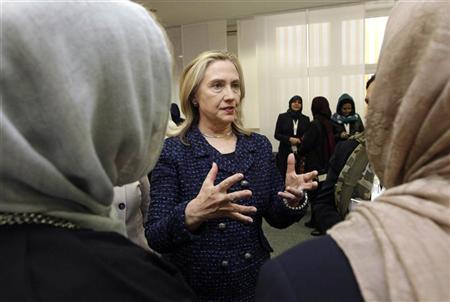Latest NEWS
- Aswat Masriya, the last word
- Roundup of Egypt's press headlines on March 15, 2017
- Roundup of Egypt's press headlines on March 14, 2017
- Former Egyptian President Hosni Mubarak to be released: lawyer
- Roundup of Egypt's press headlines on March 13, 2017
- Egypt's capital set to grow by half a million in 2017
- Egypt's wheat reserves to double with start of harvest -supply min
- Roundup of Egypt's press headlines on March 12, 2017
Clinton sees U.S., Israel in lockstep on Iran

U.S Secretary of State Hillary Clinton, photo by Reuters
JERUSALEM, July 16 (Reuters) - U.S. Secretary of State Hillary Clinton said on Monday the United States and Israel were "on the same page" in their determination to prevent Iran from achieving what the West fears its goal of building a nuclear bomb.
In Jerusalem on the last stop of an Asian and Middle East tour, Clinton said she and Israeli Prime Minister Benjamin Netanyahu "talked about concrete steps that we can take to continue to build the pressure" on Tehran.
Israel is widely thought to be the only country in the Middle East with nuclear weapons capability and, citing threats made by Iran's leaders to destroy it, has made clear it would attack the Islamic Republic if diplomacy fails.
Iran denies Western accusations of a covert agenda to develop a nuclear weapon, insisting it wants to stockpile enriched uranium solely to generate more electricity for a rapidly growing population and radio isotopes for medical use.
Talks between world powers and Iran to resolve the standoff have so far failed to secure a breakthrough.
Clinton said that while Washington would prefer a diplomatic resolution to the impasse with Tehran: "Our own choice is clear, we will use all elements of American power to prevent Iran from obtaining a nuclear weapon."
She accused Iran of failing to respond so far to diplomacy. "I made very clear that the proposals we have seen from Iran thus far within the P5+1 negotiations are "non starters," she said.
Referring to her meeting in Jerusalem with Israeli Prime Minister Benjamin Netanyahu, Clinton said "it's absolutely fair to say we are on the same page at this moment trying to figure our way forward to have the maxiumum impact on affecting the decisions that Iran makes".
Clinton's remarks and her visit, her first to Jerusalem since 2010, followed months of chilliness between Netanyahu and the administration of President Barack Obama, who faces a Nov. 6 re-election bid against a Republican rival who regularly accuses Obama of being insufficiently supportive of Israel.
Republican candidate Mitt Romney is also planning a visit to Israel this month. Obama has not visited the Jewish state as president.
Both Israel and the U.S. say they reserve the right to attack Iran to prevent it from obtaining nuclear arms, but Washington has leaned on Israel to be patient while newly tightened economic sanctions have an impact and negotiations run their course.
TIGHTER SANCTIONS
Obama has imposed much tighter sanctions this year on countries that do business with Iran, and the European Union has imposed an embargo on Iranian oil that took effect on July 1.
Netanyahu told Clinton, in public remarks before they met behind closed doors: "We have our common effort to make sure that Iran not achieve its ambition of developing nuclear weapons."
Wrapping up a visit to Asia and the Middle East that included talks in Egypt, Clinton tried to assuage Israeli concerns about Arab world revolts that have toppled regimes, bringing Islamists to power in some countries, such as Egypt.
Clinton urged Israel also see the Arab Spring as an opportunity, telling President Shimon Peres that "it is in moments like these that friends like us have to think together, act together. We are called to be smart, creative and courageous".
"It is a time of uncertainty but also of opportunity. It is a chance to advance our shared goal of security, stability, peace and democracy along with prosperity for the millions of people in this region who have yet to see a better future," she said.
She urged Egypt's new president Mohamed Mursi, of the long-banned Muslim Brotherhood, to respect a 1979 Egyptian-Israeli peace treaty, describing it as a bedrock of regional stability.
Netanyahu, speaking at Clinton's side, said Egypt "has been an anchor of peace and maintaining the peace treaty between us, I think, is something that is uppermost in both our minds".
The 22-month gap from Clinton's last visit to Israel, before U.S.-brokered peace talks between Israel and the Palestinians deadlocked in 2010, reflected the absence of progress on that front.
The talks froze after Netanyahu rejected Palestinian demands that he extend a partial freeze on settlement construction that he had introduced at Washington's behest.
Clinton also met Palestinian Prime Minister Salam Fayyad, who made no public remarks.
Netanyahu told Clinton "we have to invest every effort to maintain the tranquility and see if we can move the process forward" with the Palestinians. But few diplomats expect any breakthrough before the U.S. presidential election. (Writing by Allyn Fisher-Ilan; Editing by Louise Ireland)










